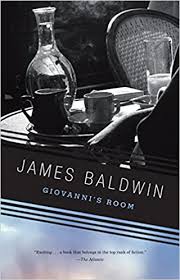I didn’t know how to consider Giovanni’s Room when I first began reading. I had been told that this was a novel about a man’s affair with another man, and each character was deeply flawed. And all good characters are flawed, they are complex. There are things you love about them and things you deeply deeply dislike about them. But this was a novel about a person that wasn’t hetero-sexual, someone who wouldn’t fit the status-quo. I was tentative. I didn’t want to read another flat, gay-coded character.
And Giovanni’s Room did nothing of the sort. Written by James Baldwin, it follows David, an American in Paris and his affairs with an Italian bartender, Giovanni. Each character bares their emotions on their sleeves and it creates this vulnerability within the novel. Sometimes it feels as if I’m reading something private, or walking into an occupied room.
As I read through the novel, I continued to wonder what was at stake for me? What was I willing to lose, or change, by my experience of reading this book? David infuriated me, I wanted to smack sense into him, take him by shoulders and shake some sense into him. And the more infuriated I became with David the more I saw myself in him. I saw qualities that we shared, and they weren’t pretty ones. Giovanni’s Room was presenting me an opportunity to see myself in another lens. And isn’t that a scary thought.
With this idea lurking in the back of my mind, I continued on reading, continued on being infuriated by David. I found myself thinking about the premise; what overarching, universal, unanswerable question was Baldwin trying to answer? I arrived at the premise: What if your sexual desires were not socially unacceptable?
We see David approach this question throughout the novel and he never seems to find a way to navigate it. Or maybe he does, but it’s not the outcome readers are wishing for. His first encounter with this premise occurs on page 6, “[Joey] was a very nice boy, too, very quick and dark, and always laughing. For a while he was my best friend. Later, the idea that such a person could have been my best friend was proof of some horrifying taint in me. So I forgot him.”
David desires Joey, as a friend, as a companion, but it is this dooming shadow of being a man that lays with men that swallows up David’s desire. This part of him shrinks and continues to shrink throughout the novel. Here, David has had his first encounter with the premise, what do you do when your desire is “wrong”? In this instance, he chose to forget him. To pretend that nothing happened in the morning and then avoid Joey for the rest of the summer, and then forget him.
This quick little passage also begins to show a controlling idea within the novel. The controlling idea is defined by Mckee as something that “may be expressed in a single sentence describing how and why life undergoes change from one condition of existence at the beginning to another at the end” (115). The controlling idea began to reveal itself to me as: Being truthfully with someone makes you vulnerable and weak.
If David was to continue to be open with Joey, it would leave him vulnerable to the society and their impression of what is “right” and “moral”. If David let himself wake up the next morning and continue to give himself to Joey, everything would change. And the idea of this vulnerability and “moral responsibility” is what led David to operate within the counter controlling idea: One must protect themselves emotionally in order to survive.
In the morning David leaves with a lame excuse, one that he knows Joey didn’t believe, but he flees anyway. The desire to protect himself and to continue to operate within this morally acceptable version of himself is so intense that he can’t ignore it. It’s easier, it’s safer, for David to self destruct and forget about Joey. He can continue to operate as this heteronormative version so he can survive within society.
To see the operates of the controlling and counter ideas more clearly, the following is a value graph David’s interaction with Joey:
He was a very nice boy, too, very quick and dark, and always laughing. +
For a while he was my best friend. +
Later, the idea that such a person could have been my best friend –
was proof of some horrifying taint in me. –
So I forgot him. –
But I see him very well tonight +
page 6
There is the continuous upwards tic as David reflects on Joey and describes him in a very fond way. He’s reminiscing about Joey, how nice their friendship was, and even how nice this last day together was. Then there’s a switch, and suddenly David is thinking about how unbelievable it was that he was so close to a person. For a moment, he was vulnerable and let himself sit in this fond reminiscing, then it switches and he closes off. Detaching himself from this memory as if it’s too painful to remember fully. At yet, he can’t help himself, David “sees him very well tonight.” He continues to think fondly for Joey and he can’t help but let himself be a little vulnerable, at least to this memory.
There is a complexity to David and his hiding in Paris that I find myself fascinated by. While I have finished reading the book and know the plot points that extend beyond this moment with Joey, I can feel that there are mountains of secrets to uncover within these pages. And honestly, it’s exciting.
-Angelina Sakkestad

Leave a comment